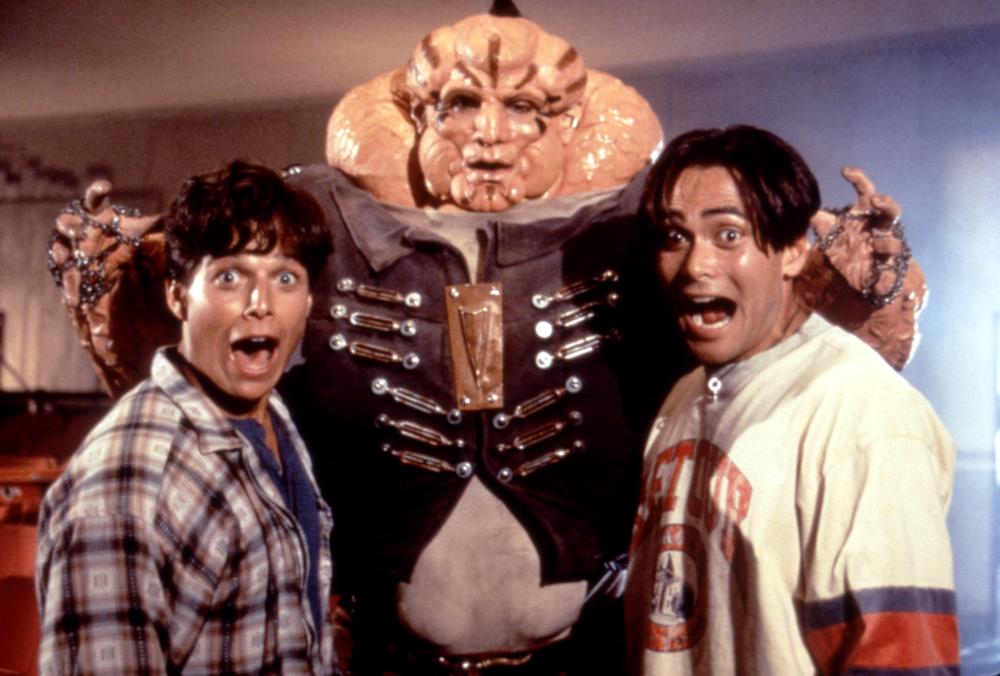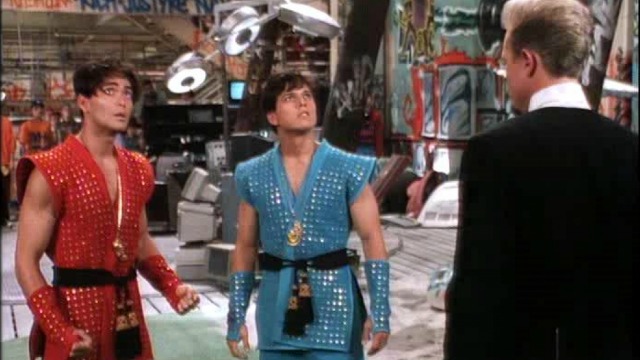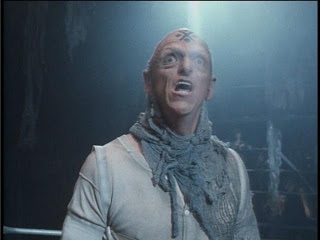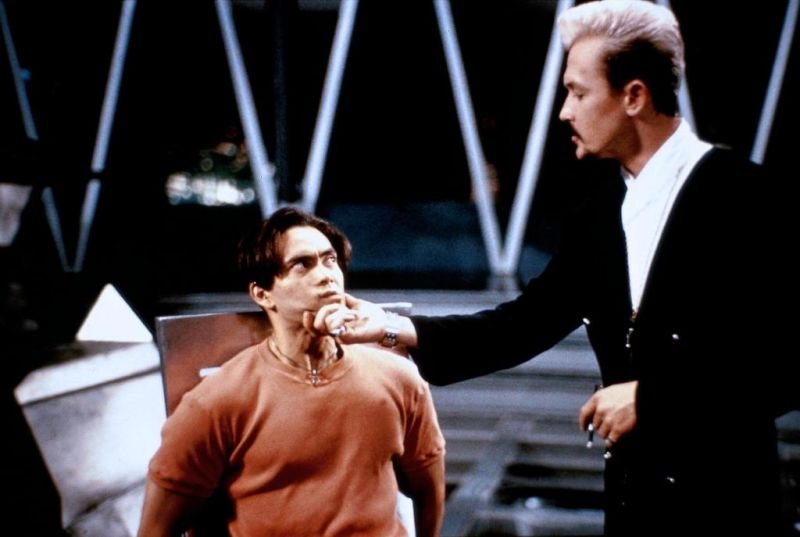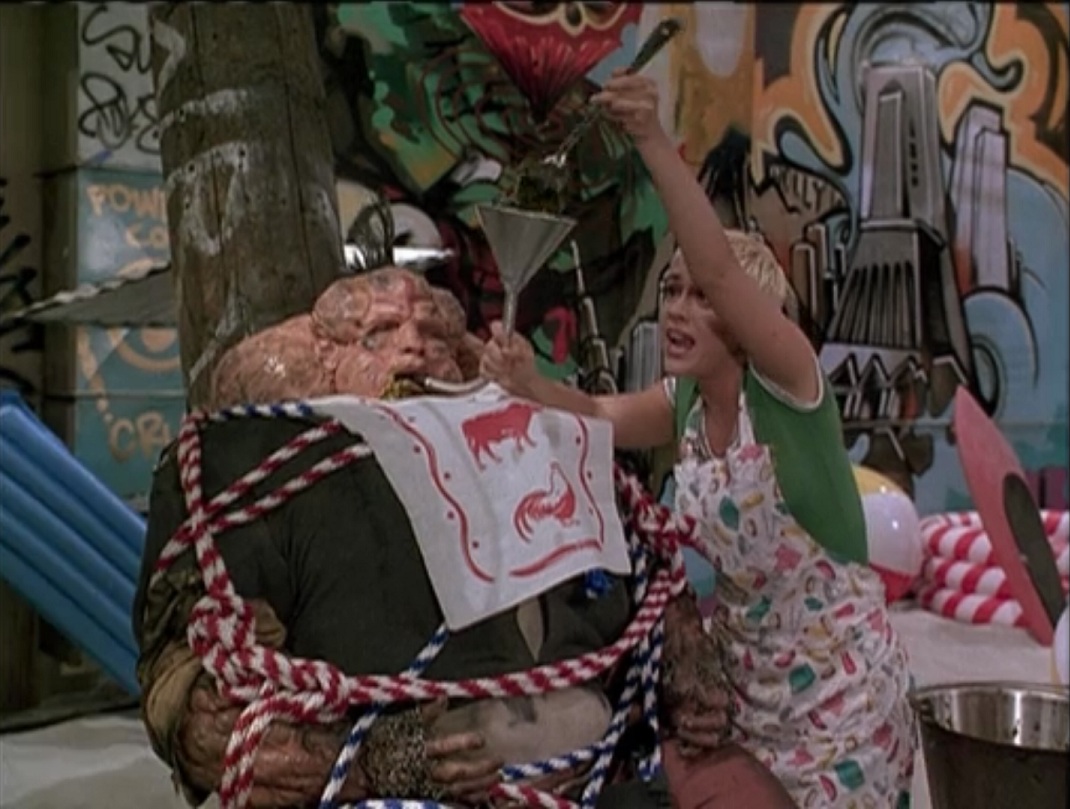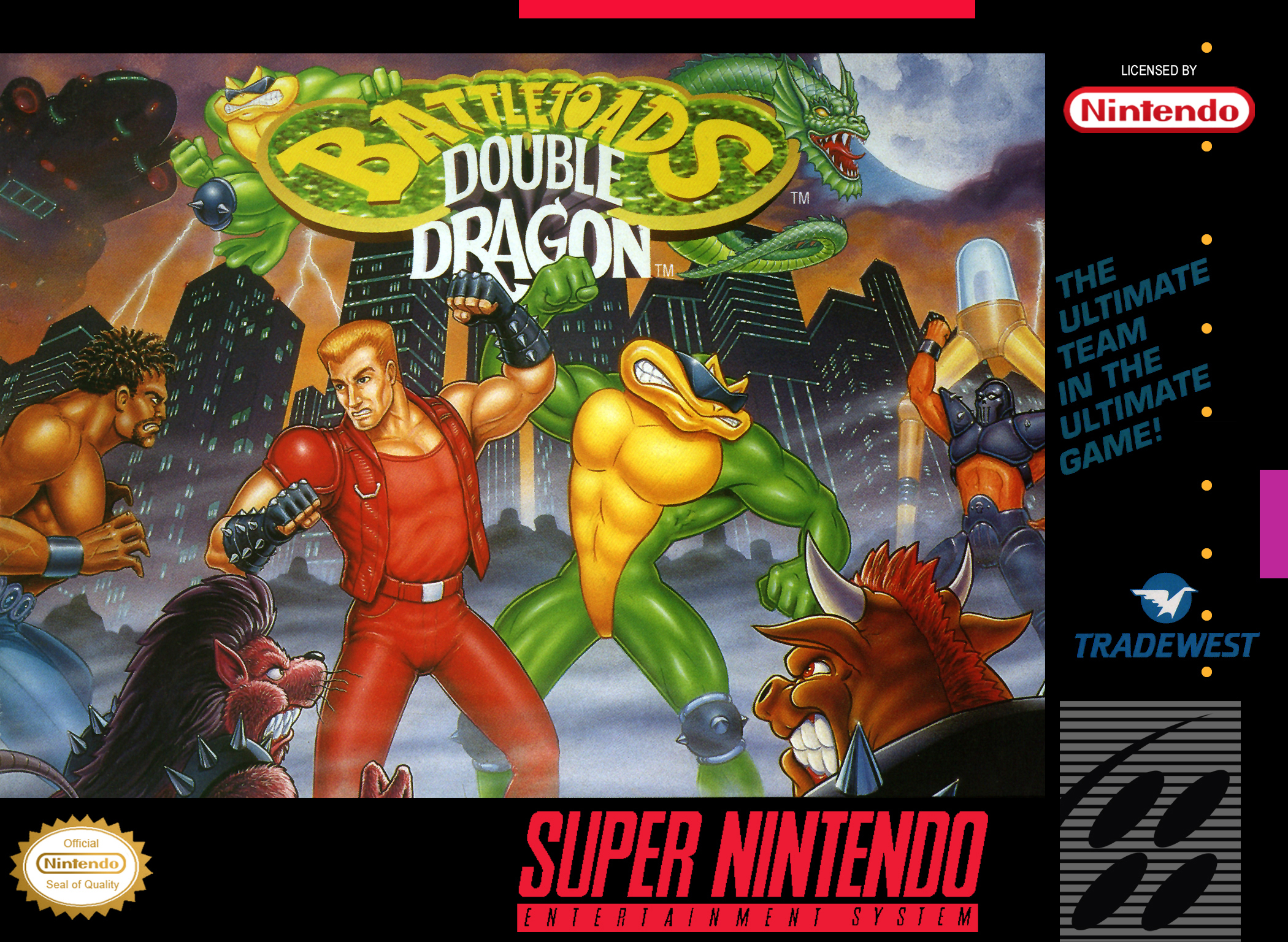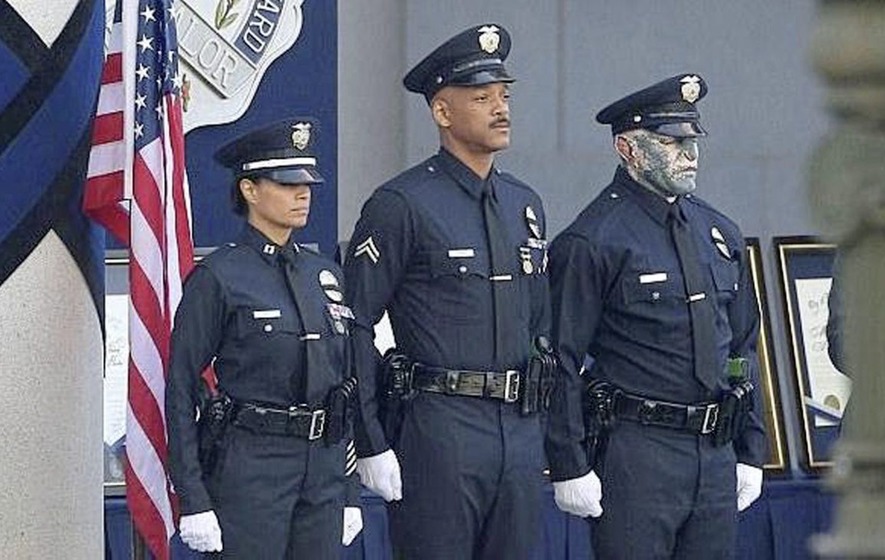The 1994 Feature Film Adaptation of Double Dragon Was a Real Stinkeroo
They have fun!
Double Dragon takes place in a dystopian 2007 ravaged by massive earthquakes and lousy with lawlessness, but it’s nevertheless the single most 1994 movie ever made. I never stopped being distracted by the fact that the film’s leads, Jimmy (Mark Dacascos) and Billy (Scott Wolf) rock the same awkward look I did as a 14-year-old: shapeless jeans, outsized sweatshirts, flannel-print long-sleeve shirts occasionally tied around the waist, sorority girl style, and shaggy hair parted in the middle, in the manner of a sheepdog.
They literally change into these costumes in the last ten minutes.
It was a terrible look for me as a disgruntled teenager. It’s an even more perplexing look for the stars of a would-be-action movie franchise. I thought about this a lot during Cannon month, but why would grown men choose to fight in jeans? Aren’t they a singular combination of constraining and uncomfortable? Chuck Norris had his own line of action jeans specifically designed to facilitate impactful and stylish kicking, but in actuality, physical skirmishes in jeans are as aesthetically unappealing to watch as they must be uncomfortable to fight.
Ah, but there’s so, so much more wrong with Double Dragon than its unfortunate, Jay Leno-level fondness for denim. The problems start with the leads: Scott Wolf, a tiny Jewish TV heartthrob seemingly chosen due to his vague resemblance to Ralph Macchio as teenaged fighting progeny as Billy Lee, and, as his brother Jimmy, Mark Dacascos, a gentleman of Filipino, Spanish, Chinese, Irish and Japanese ancestry seemingly chosen for fighting chops he doesn’t get to show off much here despite this being an action movie.
Wolf and Dacascos don’t look like brothers. They don’t act like brothers. They don’t seem like brothers. Neither is remotely believable as a teenager. They have no chemistry. Individually and collectively, they barely register.
Robert Patrick strides theatrically into this yawning charisma void as Koga Shuko/Victor Guisman, a nefarious businessman with a look that suggests heyday-era Arsenio Hall cos-playing as Max Headroom, plus the requisite unflattering facial hair.
It’s the kind of shamelessly hammy role that angrily demands that an over-actor cackle lines like, “I just want total domination of one major American city! Is that too much to ask for? Is it? Is it? Huh?” with demented glee.
The film’s plot finds Koga Shuko in possession of one-half of a magical medallion known as The Double Dragon. He’s in a furious hurry to retrieve the other half, so he sends his henchmen to snatch it from Satori (Julia Nickson), the Lee brothers’ guardian and spiritual mentor. Satori martyrs herself to keep the Double Dragon from falling into Koga Shuko’s evil hands, but not before giving half of the medallion to the brothers for safekeeping.
The Lees’ battles with various gangs are redolent of The Warriors. The key difference is that Billy and Jimmy perpetually seem to be squaring off against henchmen, all dressed flamboyantly yet randomly in a series of glorified Halloween costumes. At one point, one of the brothers beats up a portly man dressed up like a mime (Double Dragon is not shy about stealing), a man in an AC/DC-style randy schoolboy get-up, and a dude who looks like Eriq LaSalle in Coming to America in rapid succession.
While we’re on the matter of thievery, Koga Shuko is able to magically assume the bodies of various people thanks to his possession of half of the Double Dragon medallion. This means that only a few years after his breakthrough role as a shape-shifting evil android in T2: Judgment Day, Patrick was once again playing a sinister villain with the ability to change form at will.
In their bid to save the city and keep Koga Shuko from procuring the second half of the Double Dragon medallion, the brothers join forces with Marian Delario (Alyssa Milano), the head of a group of vigilantes known as the Power Corps. In the video game, Marian was nothing but a damsel in distress, yet another beautiful, helpless woman waiting to be saved.
Double Dragon gives the character more agency, as well as a bleached-blonde, androgynous look that screams, “Tank Girl goes skateboarding,” but late in the film she ducks down to crawl into something and the film cuts to the Lee brothers lovingly ogling her posterior and then grinning to each other in a way that silently but forcefully conveys that while, yes, this character is strong and empowered and ready to bring the fight to the bad guys, she’s also a sweet, sweet piece of ass to be ogled and admired by the audience as well as the film’s characters.
Double Dragon is most assuredly not a comedy. It doesn’t always remember that, however. Every twenty minutes or so, it will forget that it’s a deeply confused, garish, beat-em-up action movie and go hard for yucks. These gags clash so violently with the tone of the rest of the film that they seem to belong to a different movie altogether.
In this kooky future dystopian version of 2007, duct-taped together from bits and pieces of The Warriors, Demolition Man, and Blade Runner, George Hamilton, Vanna White, and Andy Dick are all newscasters delivering wacky headlines like, “Madonna says her marriage to Tom Arnold is finished, and she’s moving to Paris.”
It’s “funny” because they’re celebrities! Dick plays the city’s “Smogcaster.” It’s adorable and also heartbreaking that Double Dragon imagined that Andy Dick, fucking Andy Dick, wouldn’t age at all between 1994 and 2007 and, thanks no doubt to clean living and smart choices, would look every bit as baby-faced and adorable as he did when he filmed Reality Bites. You are incorrigibly optimistic, Double Dragon, except for that whole part about the future Los Angeles being a nightmarish wasteland.
The film’s sporadic, random, and juvenile sense of humor is also reflected in news reports from good old channel 69 (nice!) and a literal throwaway gag where a postman is hurled from a tall building, seemingly to his death, and Mark Dacascos, apparently unconcerned about the violent assault he’s just witnessed, quips, “I’ve never seen a mailman move that fast!” then high fives his brother.
Later a crazy dude dressed as a mailman tries to kill the brothers. I’m not sure whether the aforementioned postman made an incredible recovery or if it’s a mailman out to avenge the brothers’ callousness regarding his colleague’s possible death, but I was honestly more invested in this random mailman’s attempt to kill the Lees than I was in their attempts to thwart the bad guy and save the city.
Speaking of Patrick, he gets the film’s biggest and silliest dialogue, so it's fitting that when he’s being led away in handcuffs after his reign of terror has ended, he roars, "If you think I'm bad, wait until you meet my LAWYERS!”
It’s an exquisitely terrible dad joke to go out on, and while I personally would have preferred, “If you think I'm bad, wait until you meet my MOTHER-IN-LAW!” I suppose the lawyers’ line makes more sense in context.
Oh, the things that could have been! #BiggestCrossoverEver
Speaking of the legal system and misguided attempts at comedy and social satire, Double Dragon really goes out of its way to be pro-law enforcement and pro-cop, which is a bold move for a 1994 movie about Los Angeles. The head of the police is depicted as an incorruptible hero beset at all sides by bleeding-heart reporters asking questions like, “Maybe the gang members just need a hug!” and “Maybe the gang members are just misunderstood!”
In case there’s any doubt that the film sympathizes with the forces of law and order, once Jimmy inhabits Koga Shuko’s body in the film’s climax, he decides to make the bad guy donate one hundred twenty-nine million dollars to the police department before insisting he be arrested.
In Double Dragon, the cops aren’t just an unambiguous force for good in a world gone mad: they’re so worthy they deserve charity more than starving children.
That's some explosive fashion you're rocking there, Lee brothers!
Despite the abundance of graffiti in its oversized sets, most of which seem to be going for a “post-apocalyptic teen rec center” vibe, and the countercultural sounds of The Farm on the soundtrack, Double Dragon is ultimately deeply square.
I came to it with modest expectations. All I really wanted was to see actors reproduce the digitized mayhem of a game I adored as a child. Even on that level, the movie only delivers intermittently. It was neat seeing hulking bad guys from the game in the flesh, but it'd be more impressive if you weren’t able to so clearly make out the bald cap of a towering, mohawk-sporting villain.
Double Dragon is astonishingly stupid, even for a video game-based movie. Yet I enjoyed it all the same not because it was good but rather because it was bad in a way that resonated with me as a Gen-Xer deeply nostalgic for the video games of his youth. If you’re not a 41-year-old man who used to skip ninth grade so he could play Double Dragon at a sketchy convenience store, I’m guessing you’ll have a much different experience watching this unadulterated slab of 1994.
In the big final fight a stand-up Double Dragon arcade game—one that sent shivers of nostalgic joy down my spine—is the first to be destroyed in a heated battle in an arcade. That’s an unusually on-the-nose visual metaphor for what this film does to its inspiration, but if Double Dragon ultimately does not do justice to an important and literally kick-ass game, it at least it dishonors it in a campily entertaining fashion.
Nathan needs teeth that work, and his dental plan doesn't cover them, so he started a GoFundMe at https://www.gofundme.com/f/support-nathans-journey-to-dental-implants. Give if you can!
Did you enjoy this article? Then consider becoming a patron here

